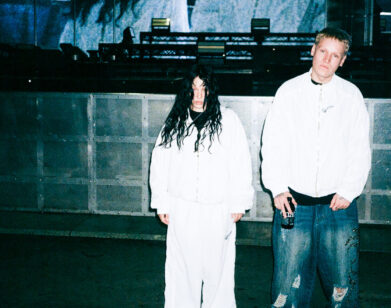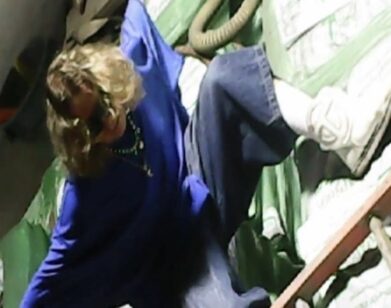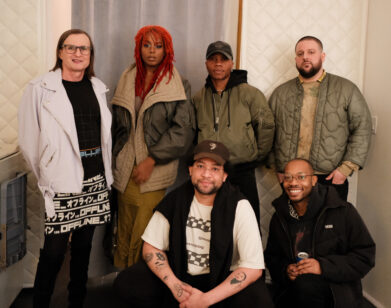Techno auteur Daniel Avery is determined to never repeat himself
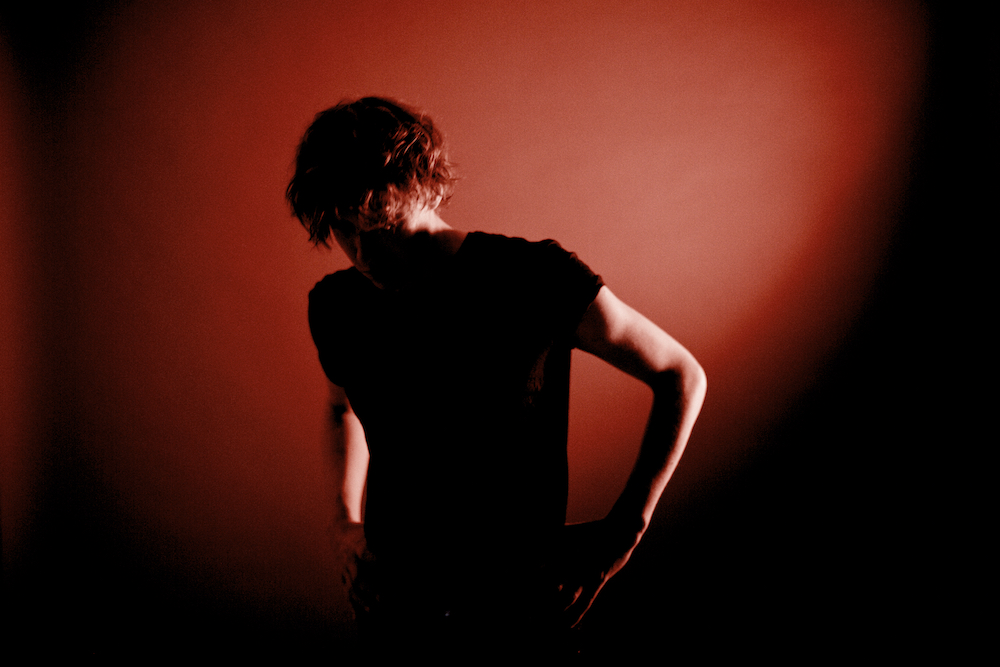
It’s been five years since the multifaceted London-based producer Daniel Avery released his cult club masterpiece Drone Logic, a lasting document of second-wave minimal techno that helped to further legitimize the genre in the eyes of critics (while still totally capable of shaking the dance floor).
After half-a-decade spent touring the world as an in-demand DJ, Avery is back with his follow-up LP for Mute, Song For Alpha. While inhabiting a lot of the same dark, alien psychic spaces as his previous full-length, Song For Alpha explodes any expectations one may have held of Avery’s narrative: it’s a menacing, fang-toothed work that has as much in common with the pummeling ambience of Ben Frost or William Basinski as it does with Richie Hawtin.
A month ago, Avery released the new single “Slow Fade,” along with a remix EP of the track. Last week, he released a video for the track. I reached him by phone, when he had a little downtime in London. We spoke about his new record, his favorite club Fabric’s near-death, a new record he’s making with Alessandro Cortini, and more.
DALE EISINGER: You were touring a lot in the last five years. How did you manage to get a record made while doing that?
DANIEL AVERY: It became almost a necessity to be in the studio. I found that I definitely need that counterbalance, to have studio time and a studio space where I can take a break and have somewhere that feels totally different to a nightclub. That’s what I really aimed for with my studio. It’s this really lovely secluded part of London in a converted shipping container right next to the water, over the Thames, and it’s really peaceful down there. I love the world of techno but it is just one side to who I am. I need both sides of that coin otherwise I just burn out too quickly.
EISINGER: As someone who made such an impactful techno record, it seems like your influences are so much more disparate than just dance music. Can you speak to that at all in relation to the new record?
AVERY: I’ve always been fascinated with ambient music and drone music, artists like Brian Eno or someone like William Basinski. That whole world is always really fascinating to me. It’s always been apart of me, it’s always been inside me, but I feel as though on this new record, maybe through necessity, it’s come out quite heavily. And it’s something that I really wanted to push – to me it all feels like it comes from the same place anyway. I’m just a huge fan of psychedelic music and by that I’m not really referring to any specific genres. I just like music in which you can get truly lost. Those moments where you close your eyes and everything else just seems irrelevant in those moments. That can be a techno record or it can be an ambient record that’s extremely quiet. But to me they hold the same energy. So I’ve definitely explored a lot of those ideas on the new record. Even though I think it’s probably a techno record at its heart.
EISINGER: Did you feel with Drone Logic and how it succeeded specifically in the dance club with so many people, did you feel pressure to make another dance record?
AVERY: No, is the short answer. I just realized very early on that I wasn’t interested in saying the same thing again. Drone Logic was made five years ago and my life has changed considerably in those 5 years. Listening again now, I can hear a sort of youthful urgency to it. Which I really like but I wanted to not focus on that again. So this new album, I feel like it is a club-based album or there are definitely elements that have been heavily influenced by the club. And really the pressure was myself, not to do exactly the same thing again.
EISINGER: As you mention the term psychedelic, it gets thrown around a lot in relation to your music and has been used a lot in the last decade to refer to a certain kind of aesthetic, but I don’t know where that lands right now. Can you explain that a little more?
AVERY: I do think it’s this idea of music that can transport you to another place. A lot of artists have this desire to make their record sound real, to be a real record, to be a real artist. I respect that hugely. But the music that interests me is the music that sounds unreal. Music that sounds like it comes from somewhere else entirely and grabs you by the hand and takes you somewhere that you haven’t really been before. To me that’s psychedelic music. I wanna hear records where I have no idea even what instrument that is, let alone what pedal that is, you know? those sorts of things really excite me. It all feeds back into this idea of just being able to close your eyes and take a breath and just be taken somewhere else by it.
EISINGER: Your music is often thought about in terms of the club context but you’re talking about this writing process that is so isolated. Is there something that you feel when you’re writing this that you just think like, oh that’s it, this is what I’m looking for?
AVERY: A lot of the stuff does get road tested quite heavily, just from DJing out so much. I am in that fortunate position where these tracks have seen several versions of themselves. A good example of that is the track “Sensation.” It’s one of my favorite records and it’s definitely a techno record. It was conceived to be played in nightclubs. I made a version and I had a gig with Erol Alkan, who also mixed the record with me. It sounded fine but it maybe sounded slightly anonymous, and those huge swelling pads in it that I just wanted to be overwhelming and totally enveloping—we went back into the studio the following week and Erol said, “Those have got to be five times louder.” So we just took the fader and pushed it five times louder. It’s almost an extreme amount, so that record is extremely close to peaking. It’s extremely close to distorting because those pads are so loud. So it’s techno music but techno music that has these psychedelic elements that are almost overbearing and almost overpowering. If you close your eyes in the club it sounds like the music is 50 feet tall.
EISINGER: I think one of the luxuries that your music enjoys is its ability to work in headphones or off a tinny speaker. They’re somehow such personal records while at the same time being so alien and machine-driven. How do you figure out what emotional palette you’re looking for? Because it’s definitely a feeling that’s similar between Song For Alpha and Drone Logic.
AVERY: That’s something I’ve really been keen to have in all my music is that whilst this is machine music, this is robot music, for me it has to have a human heart. It has to have that human pulse to it. I don’t have an answer in terms of how it comes about, but sometimes you just feel it. When that human energy comes through you can just feel it in your chest. I don’t really know where it comes from, but, when it hits, you know it.
EISINGER: It’s been five years since you put out a record and you’ve travelled the world. What do you think has been the most positive change for dance music and club culture that you’ve seen in your last five years of touring?
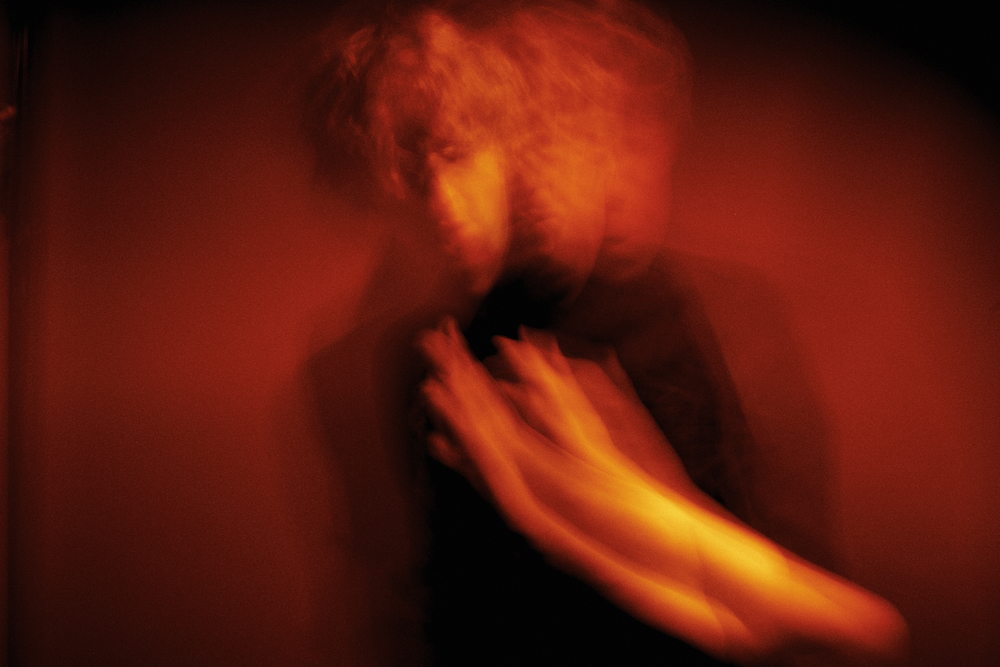
AVERY: It feels healthier than it did even five years ago. The youthful energy has always been there but it’s really taken hold recently, and there are so many nights coming up now with young groups of kids just rolling the dice and taking chances and playing things that they love, and it’s not just about huge clubs, just a 100-capacity basement and it’s not huge names. That has been a huge change to see DJs coming up now who are able just to bring their world into a different place. Another positive change is it’s not just about producers making one hit and then afterwards, learning how to go and DJ. That doesn’t fly anymore. You see a lot of DJs now who don’t produce music but they still live and breathe it, they still live and breathe this world and that’s hugely exciting. And on top of all of this, the idea of inclusiveness is really coming in again. And of course we’re seeing the emergence of some incredibly exciting female DJs coming out. They’ve always been there, but their entry into this world is really exciting right now. It’s taken too long but right now it’s exciting to see.
EISINGER: I’m curious to what your response was to the whole drama with Fabric, one of your staple nightclubs. It was almost shut down. How did that affect what was going on in your life?
AVERY: That whole period was heartbreaking and felt as if, I’m really trying not to say the word Brexit but it came at a really similar time to that and I do not want to be seen as a political artist but, along with Fabric, it felt as if there was an older generation that didn’t understand anything about younger generations: how they operate, just deciding stuff on behalf of them because they thought they knew best. A club being shut down, huge restrictions being put on security, because they thought it would keep drugs out of nightclubs or whatever, is so backwards and so dangerous. You’re just going to have kids taking all their drugs at home. This is a very complicated issue that I don’t want to go into too much but that kind of thing is heartbreaking. What’s encouraging is to see the resurgence of it. The response was heartwarming. The fight back was really something to behold.
EISINGER: Do you have anything else you’d like to tell me about the record or what you have coming up?
AVERY: Actually one name I forgot to mention when we were talking about ambient stuff—someone who’s really influenced me is Alessandro Cortini, an artist I hugely admire. We collaborated last year on two tracks and it felt extremely natural, so we’re working on more stuff together that’s coming this year. We’ve already got a few bits together and I have no idea what form it’s going to take, but it feels really good right now.
DANIEL AVERY’S NEW RECORD SONG FOR ALPHA (PHANTASY SOUND) IS OUT APRIL 6TH ON MUTE RECORDS.


